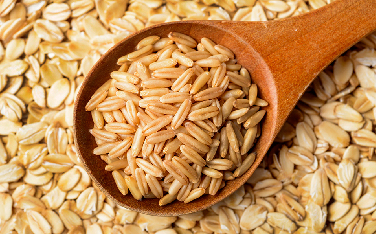A large study indicates that people who eat whole grains of any kind every day are much less likely to develop type 2 diabetes. The researchers urge people not to mistakenly avoid whole grains if they intend to follow low-carb diets.
Scientists at Chalmers University of Technology in Gothenburg, Sweden, investigated the health-related data of tens of thousands of people over many years to understand how eating whole grains influences a person’s risk of type 2 diabetes.
Previous studies, they say, looked primarily at the consumption of one type of grain, namely wheat, and suggested that it may have a protective role against diabetes.
However, the team wanted to see whether different kinds of whole grains would also have similar effects.
“Most studies similar to ours have previously been conducted in the [United States], where people mainly get their whole grain from wheat,” explains senior researcher Prof. Rikard Landberg.
“We wanted to see if there was a difference between different cereals. One might expect there would be, because they contain different types of dietary fiber and bioactive substances, which have been shown to influence risk factors for type 2 diabetes.”
However, as the researchers report in a study paper now published in The Journal of Nutrition, all commonly eaten whole grains appear to have the same positive protective effect.
All whole grains are good for you
The scientists worked with data collected from 55,465 participants via the Danish Diet, Cancer, and Health cohort study. All the participants were between 50 and 65 years old and free of diabetes at baseline, and they were followed up for a median period of 15 years.
When they joined the study, they filled in forms in which they gave details about their dietary habits, which included how many whole grains — such as wheat, rye, and oats — they ate every day.
The participants also indicated what kinds of whole-grain products they consumed, such as rye and other whole-grain breads, oatmeal porridge, and muesli.
To determine how many of these participants later developed diabetes, the researchers also used data from Denmark’s national diabetes register. A total of 7,417 participants received a type 2 diabetes diagnosis during the follow-up period.
Prof. Landberg and team revealed that eating any type of whole grain on a daily basis appeared to keep type 2 diabetes at bay.
Still, those who reported consuming the most whole grain each day — at least 50 grams every day, or about one portion of oatmeal porridge and one slice of whole-grain bread — had the lowest risk of developing diabetes.
The less whole grain that a participant ate each day, the more their risk of diabetes increased, the researchers explain.
Among those who ate the most whole grains each day, the risk of diabetes was 22 percent lower for women and 34 percent lower for men, compared with the individuals who reported eating the least amount of whole grains.
“It is unusual to be able to investigate such a large range when it comes to how much whole grain people eat,” says Prof. Landberg.
“If you divided American participants into four groups, the group that ate the most whole grain would be the same level as the group that ate the least whole grain in Denmark. In Europe, Scandinavia eats the most, Spain and Italy the least,” he adds.
‘The research results are clear’
The researchers also explain that their results strengthen existing dietary advice for the prevention of diabetes, which suggests switching from products made from white flour to whole-grain foods.
They also note that making other dietary changes — such as avoiding red meat — can help people keep diabetes at bay.
“Our results are in line with dietary advice, which recommends switching out foods containing white flour for whole grains,” says Prof. Landberg.
“You get extra health benefits — white flour has some negative effects on health, while whole grain has several positive effects, beyond protection against type 2 diabetes,” he adds.
Additionally, the authors warn that some people may wrongly avoid eating whole grains altogether because they want to follow a low-carb diet. However, they explain, not all foods that are high in carbohydrates are also harmful.
“Carbohydrates are a very varied group of foodstuffs, including sugar, starch, and fiber,” notes Prof. Landberg, adding, “We should discuss these more individually, and not throw them together in one group, because they have totally different effects on our physiology and health.”
“When it comes to whole grains,” he concludes, “the research results are clear: among the many studies which have been made, in varied groups of people around the world, there hasn’t been a single study which has shown negative health effects.”

